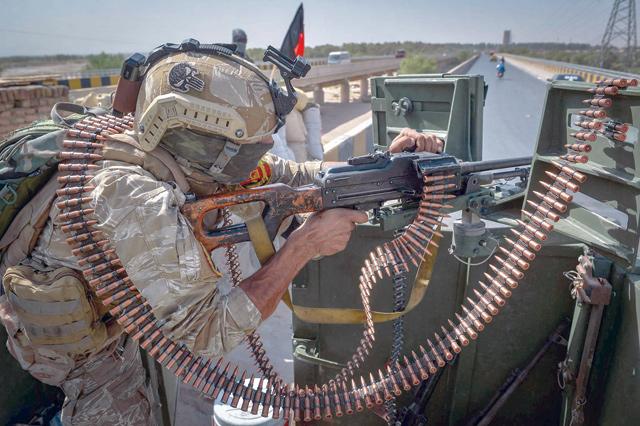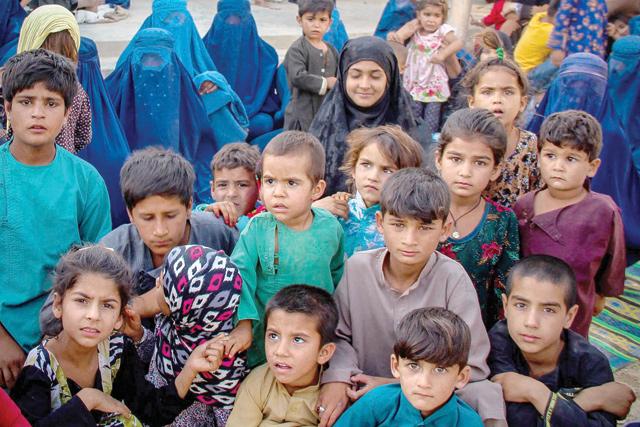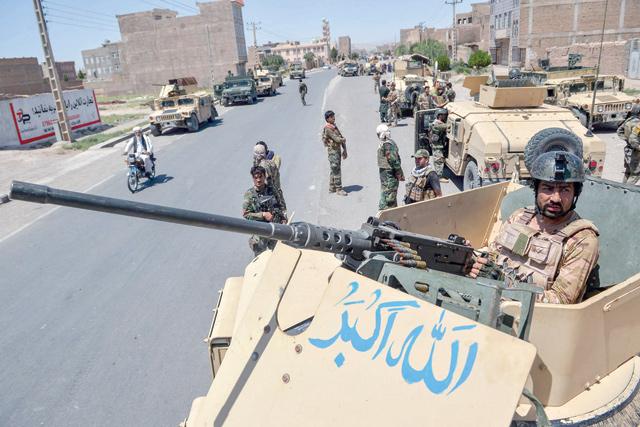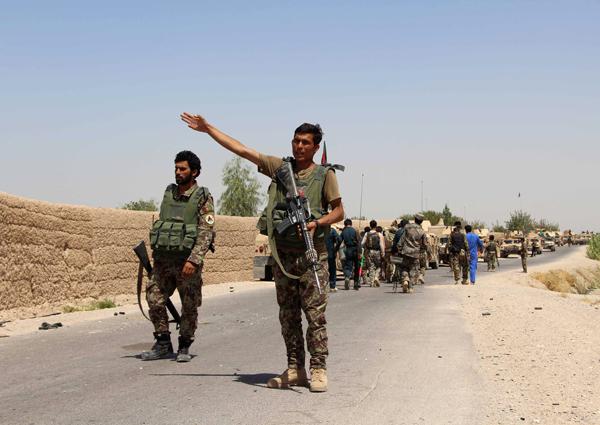You are here
Afghan forces bomb Taliban fighters to repel assaults on key cities
By AFP - Aug 01,2021 - Last updated at Aug 01,2021

A security personnel stands guard on top of a vehicle outside United Nations Assistance Mission in Afghanistan (UNAMA) office compound in Guzara district of Herat province on Saturday (AFP photo)
KANDAHAR, Afghanistan — Afghan forces fought fierce street battles and bombed Taliban positions on Sunday while insurgents swarmed major cities as they stepped up their nationwide offensive.
Hundreds of commandos were deployed to the western city of Herat while authorities in the southern city of Lashkar Gah called for more troops to rein in the assaults even as Afghan air strikes left scores dead on the streets, residents said.
Fighting has surged across Afghanistan since early May when US-led foreign forces began a final withdrawal that is now almost complete.
After seizing large tracts of rural territory and capturing key border crossings, the Taliban have started assaulting provincial capitals.
Flights out of Kandahar, Afghanistan's second-largest city and the former stronghold of the insurgents, were suspended on Sunday after two rockets hit the runway before dawn.
The Taliban claimed the attack, saying government warplanes were "bombarding" their positions from the airport.
Airport chief Massoud Pashtun said flights resumed later on Sunday after the runway was repaired.
The facility is vital to maintaining the logistics and air support needed to keep the Taliban from overrunning the city, while also providing aerial cover for large tracts of southern Afghanistan.
The rocket barrage came as the Taliban inched closer to overwhelming at least two other provincial capitals, including nearby Lashkar Gah in Helmand province.
"Fighting is going on inside the city and we have asked for special forces to be deployed," Ataullah Afghan, head of Helmand provincial council, told AFP.
Afghan security forces have increasingly relied on air strikes to push the militants back from cities even as they run the risk of hitting civilians in heavily populated areas.
“Every inch of the city has been bombed,” Badshah Khan, a resident of Lashkar Gah, a city of 200,000 people, told AFP by phone, adding the two warring sides were fighting “street to street” battles.
“You can see dead bodies on the streets. There are bodies of people in the main square,” he said, adding the Taliban had even surrounded the city’s police headquarters and governor’s office.
Humanitarian organisation Emergency said its hospital in Lashkar Gah was 90 per cent full after receiving dozens of casualties.
“We heard bombing from the hospital throughout the night and the morning, plus small arms fire, machine guns, snipers and artillery,” said Viktor Urosevic, the medical coordinator at Emergency.
Further west in Herat, fighting continued on the city’s outskirts overnight with air strikes targeting Taliban positions, following another day of dramatic clashes between the insurgents and Afghan forces bolstered by local militia fighters.
Herat provincial governor’s spokesman Jailani Farhad said around 100 militant fighters had been killed in the attacks, a claim difficult to independently verify.
On Sunday, the ministry of defence said hundreds of commandos had been sent to Herat to help beat back the insurgent assault.
Increasing pressure
“The threat is high in these three provinces... but we are determined to repel their attacks,” Afghan security forces spokesman Ajmal Omar Shinwari told reporters, adding it was like an “emergency situation” there.
The United Nations Assistance Mission in Afghanistan (UNAMA) demanded the Taliban “provide answers” for the rocket attack on its office in Herat on Friday that killed an Afghan guard.
In a tweet posted on Sunday, UNAMA indicated there were also “violent occurrences at the Herat base” on Saturday, without offering details.
For months, the Taliban’s rapid territorial gains during the final stages of the US military withdrawal have largely been in sparsely populated rural areas.
But in recent weeks they have brought increasing pressure on provincial capitals and seized key border crossings.
The capture of any major urban centre would take their current offensive to another level and fuel concerns that the army is incapable of resisting the advances.
The government has repeatedly dismissed the militants’ steady gains over the summer as lacking strategic value but has largely failed to reverse their momentum.
The Taliban have seized Afghan cities in the past but have retained them only briefly.
The US military, despite being in its final stages of withdrawal, has also carried out air strikes against the Taliban to help the Afghan forces keep the insurgents from overrunning urban areas.
Related Articles
KANDAHAR, Afghanistan — Residents were urged on Tuesday to evacuate a besieged Afghan city as the army prepared a major offensive against Ta
KANDAHAR, Afghanistan — Afghan forces battled to stop a first major city from falling to the Taliban on Monday as the United States and Brit
KANDAHAR, Afghanistan — Fighting raged Thursday in Helmand after Afghanistan rushed military reinforcements to beat back Taliban insurgents



















